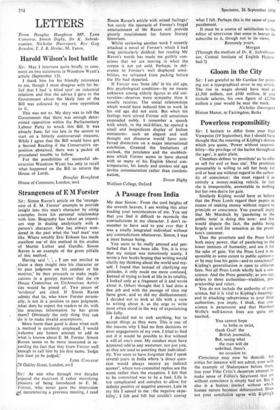Powerless responsibility
Sir: I hesitate to differ from your final Viewpoint (19 September), but I should have thought that the meaning of Kipling's dictum which you quote, 'Power without responsi- bility—the privilege of the harlot throughout the ages', is quite plain.
Chambers defines `to prostitute' as `to offer or sell for evil or base use'. The prostitute presumably is willing to sell her body for evil or base use without regard to the author- ity of conscience: she must regard it as entirely a money-making vehicle. In fact she is irresponsible, answerable to nothing but her own desire for gain.
Similarly Kipling would have us believe that the Press Lords regard their papers as means of making money without regard to principle or conscience. You yourself imply that Mr Murdoch by 'pandering to the public taste' is doing this now: and few would dispute the fact, the public being largely as avid for sensation as the prosti- tute's customer.
Thus the prostitute and the Press Lord both enjoy power, that of pandering to the lower instincts of humanity, and use it for the sake of gain. Yet the Press Lord is re- sponsible to some extent to public opinion— or he may lose his gains—and to conscience? Kipling's generalisation is open to criticism here. Not all Press Lords wholly lack a con- science. And the Press generally, as you say, defers to three authorities—tradition, pro- prietorship and rulers.
You do not include the authority of con- science, but it is vital to Kipling's meaning: and in attacking subservience to your three authorities, you imply, I think, that con- science is paramount and that Humbert Wolfe's well-known lines are quite un- merited.
You cannot hope to bribe or twist, thank God! the British journalist, But, seeing what the man will do unbribed, there's no occasion to.
Conscience may now be demo& Art critics for instance will not admit, even with the example of Shakespeare before them, (see your Film Critic's desperate attempt to make sense of Fellini's Satyricon) that art without conscience is simply bad art. But it also is a human instinct without which human nature becomes dehumanised. Does not your conclusion agree with Kipling
view that it is disregard of this authority which debases prostitutes, Press Lords—and
the rest of us? Guy Bowden Lucaslands, Highbrook, Ardingly, Haywards Heath, Sussex



































 Previous page
Previous page